
Catherine Laurence


If you want to get your gut in order, Dr Will Bulsiewicz is the expert to help you sort out fact from fiction. This is the gut-health cheat sheet...
In the fast-paced and demanding world we live in, finding moments of stillness and calm can be challenging. In an attempt to find a little peace...
This recipe provides everything you want in a decadent dessert: a lovely creamy texture, a hint of chocolate, a smooth vanilla cream, and a...
Pair Licor 43 Horchata with coffee for a perfect cocktail combination. The sweetness of pineapple juice with the creamy Horchata results in a...
This fragrant, satisfying noodly soup is a wonderful way to pack in a multitude of vibrant veggies. Thanks to the easy availability of vegan Thai...
Bring the flavours of the Mediterranean home with this hearty and comforting stew, inspired by Yia Yia’s kitchen, and brought to you by the...
This vegan take on dauphinoise potatoes hits the spot every time, and is sure to impress as part of any spread.
Vegan food aficionado Ellie Bullen perfected the recipe for these sensational bliss balls when she used to sell them at the local fruit shop...
This breakfast porridge was developed in conjunction with our good friend and wellness guru Dr Amy Carmichael. Rich in antioxidants and loaded...
Spraying sheets and pillows with calming scents can be a wonderful aid to slumber
The next time you go for a walk, discover the wonder of the everyday world around you
A skincare routine can be a way to nourish yourself inside and out
When the clouds converge, practise gratitude for the smallest of glimmers, and learn to dance in the rain.
The uplifting 6-episode travelogue-style show explores the global rise of the plant-based movement.
The plant-based food trend is truly unstoppable, and now a first-of-its-kind vegan travelogue series from celebrated Australian directors Kate Clere and Mick McIntyre is hitting screens around the world.
Across six half-hour episodes, viewers are introduced to the thriving vegan scene in the world’s leading plant-based culinary hotspots, guided by a local host.
Starting in the US, the EATING PLANTS series progresses to Germany, followed by Israel, the UK, China, and finally Australia, for a taste of what each booming plant-based destination has to offer.
Along the way, viewers discover exciting vegan foods, dishes and venues, and learn plant-based recipes, cooking and nutrition tips.
“We wanted to offer meat and plant eaters alike tips on flavours, textures, tastes and offer a new range of recipes that will add protein and nutrients to plant-based meals,” says co-creator Kate Clere. “The series aims to help educate people around this delicious new culinary trend; how to cook, shop, snack, and pack great healthy food in lunchboxes.”
The episode hosts engage with an array of experts, innovators and changemakers who are reshaping the way we eat. Along with inspiration from the hosts themselves – all of whom are vegan influencers in their own right – the series is packed with ideas and insights from plant-based doctors, athletes, chefs and other luminaries of the plant-based movement.
Notable leading lights appearing in EATING PLANTS include NYC Mayor Eric Adams, Forbes 50 over 50 luminary Miyoko Schinner, Caro Cult from Netflix BioHackers, Earthlings Director Shaun Monson, and Physicians Committee for Responsible Medicine founder and director Dr Neal Barnard.
Episode hosts include British model and entrepreneur Lucy Watson, German vegan doctor and Queer Eye star Dr Aljosha Muttardi and, here in Australia, the acclaimed actor, producer and screenwriter Martin Dingle Wall, whose tour of the Aussie vegan scene includes meeting the likes of DJ Dara Hayes, AFLW star Sabrina Frederick, International Anti-Poaching Foundation founder Damien Mander, and celebrated chef and cookbook author Sara Kidd.

The cast of Episode 6: Australia
From left to right: Sara Kidd, pastry chef; Sabrina Frederick, football player; DJ Tigerlily (Dara Hayes), DJ and influencer; Damien Mander, International Anti-Poaching Foundation; Amanda Walker, Lord of the Fries; Dr Leila Masson, paediatrician; Gilly Jaxson, chef; Angie Stephenson, Funky Pies; Tenille Evans, Vegan Weddings.
The series was conceived and shot over the past two years by Kate Clere and Mick McIntyre, the Australian duo behind the award-winning documentary Kangaroo: A love-hate story.
After touring globally with Kangaroo, they were inspired to tell the stories of the passionate plant-based entrepreneurs they met along the way. Watching COVID-19 create chaos around the world, the directors noted that more and more people started to shift their diets to reflect a deeper concern for their health and the planet.
“Many people recognise the need to switch to a more plant-based diet for their health and the planet,” says co-director Mick McIntryre. With this in mind, they set out to chart the rise of plant-based eating, with the aim of sharing practical tips about how to embrace this life-affirming lifestyle, as well as the reasons why it is such an unstoppable trend.
It’s an uplifting watch that is sure to tantalise viewers’ taste buds while also stoking their wanderlust.
The full series is currently airing on SBS in Australia. The filmmakers are also hosting in-person cinema screenings of the full series at special one-night-only events in Melbourne and Sydney on 1 and 3 May, followed by live Q&A with members of the cast. Viewers in time zones around the world can also join one of four global watch parties with special guests from the series over the weekend of 6-8 May 2022.
***
Learn more about the episodes, crew and cast of EATING PLANTS, and get the recipes featured in the series at eatingplants.tv.
Images: Eating Plants
If you want to get your gut in order, Dr Will Bulsiewicz is the expert to help you sort out fact from fiction. This is the gut-health cheat sheet...
In the fast-paced and demanding world we live in, finding moments of stillness and calm can be challenging. In an attempt to find a little peace...
Spraying sheets and pillows with calming scents can be a wonderful aid to slumber
The next time you go for a walk, discover the wonder of the everyday world around you
A skincare routine can be a way to nourish yourself inside and out
When the clouds converge, practise gratitude for the smallest of glimmers, and learn to dance in the rain.
Seven inspiring reasons to sign up for No Meat May this year!
No Meat May is a 31-day challenge that invites participants to make a meat-free pledge for the month of May. You set whatever plant-based goal works for you, then join in the fun as you expand your creativity in the kitchen, level up your nutrition knowledge, make new connections, and get daily inspiration to encourage and empower you on your journey.
Whether you’re a beginner or already on the plant-based path, here are seven great reasons to get amongst it this year.
The No Meat May challenge offers free online cooking demos, recipes and meal plans, and a No Meat May Community Cookbook just for participants. Want guidance on planning a balanced and nutritious diet? They’ve got you covered with dietitian-designed weekly meal plans, and free live webinars with Emma Strutt APD to answer your burning questions and bust the most common myths about plant-based nutrition.
No Meat May attracts participants from all over the world, of whom around 20% are from Australia and New Zealand. Founded in Sydney in 2013, this positive program has gone global and grown rapidly year by year, hitting well over 65,000 registered participants last year, with informal participation of friends, family members and work colleagues bringing the estimated number to over 130,000.
The three most commonly cited motivations among participants are: to improve their health, live more sustainably, and for the food – cooking demos, recipes and inspiring practical tips.
Based on last year’s results, we know that the average No Meat May participant reduces their food-related greenhouse gas emissions by at least a quarter – although the potential is far more: switching from a standard Australian diet to a vegan diet can cut a person’s food-related emissions by over 80%. No wonder going plant-based has been found to be the single most effective action we can take to curb climate change through our daily choices.
Along with the climate benefits, this sustainable shift has interconnected benefits for ecosystems and biodiversity, soil, air and water quality, freshwater supplies, and ensuring future generations can thrive within planetary boundaries.
Yes, that’s approximately one animal a day, for a person who goes from a standard Western diet to completely vegan!
It may seem too high at first glance, but the numbers add up when we bear in mind indirect animal deaths, whether it’s male chicks killed in the egg industry, marine animals caught as ‘bycatch’, or those that are fed to other farmed animals. There’s also the sad reality of deaths that happen on farms and in transit, estimated at around 5% in Australia. When we also consider small animals such as prawns, we see how quickly the count rises.
After taking part in No Meat May, participants report eating healthier diets, reducing their risk of chronic diseases by replacing animal products with the good stuff – including high-fibre fruit and veg, fat-free legumes and pulses, and nutrient-rich nuts and seeds.
With all the evidence about the power of healthy nutrition to add years to our lives and life to our years, every meal that packs in more plants and less meat is a win – and a month is long enough to experience some noticeable changes, too, from better digestion and more energy to clearer skin and naturally shedding excess weight.
There’s been no shortage of headlines about food shortages in recent months, and sadly world hunger is growing as a result of climate change, conflict, and economic turbulence.
The good news is, even small shifts in allocation of crops from animal feed to direct human consumption could substantially increase global food availability. In fact, if the whole world went plant-based, it’s estimated that everyone could be well-nourished on just a quarter of the agricultural land used today.
Calculations from last year’s No Meat May challenge estimate that the diet changes made during the month alone would have saved over 2000 tonnes of crops.
Although there’s mixed research about how long it takes to establish new habits, a 31-day run will undoubtedly get you well on your way, especially when you’re getting guided support and joining in with others who share similar goals. Making a time-limited commitment to yourself is a great way to take the first step (often the hardest part), and is long enough to prove to yourself that you can overcome previously perceived barriers – building self-efficacy in the process, a powerful ingredient for making positive life changes.
The No Meat May program has also been designed and refined over its 8 years to set you up for success, with its mix of resources, information and support – and participant surveys and feedback show that it works, with 93% of participants deciding to continue with changes after the challenge.
If you want to get your gut in order, Dr Will Bulsiewicz is the expert to help you sort out fact from fiction. This is the gut-health cheat sheet...
In the fast-paced and demanding world we live in, finding moments of stillness and calm can be challenging. In an attempt to find a little peace...
Spraying sheets and pillows with calming scents can be a wonderful aid to slumber
The next time you go for a walk, discover the wonder of the everyday world around you
A skincare routine can be a way to nourish yourself inside and out
When the clouds converge, practise gratitude for the smallest of glimmers, and learn to dance in the rain.
A volunteer-run sustainability group in the Macedon Ranges is inspiring residents and eateries to try plant-based for the planet.
With global crises unfolding, including an ongoing pandemic and recent record-breaking floods in Australia, it’s easy to feel powerless about the state of our planet. One of the best ways to build resilience and hope is to join up with like-minded people to make a difference.
A grassroots sustainability group in central Victoria is doing just that.
The Macedon Ranges Sustainability Group is a volunteer-run association with 13 action groups, all tackling different aspects of environmental protection. One of these is Veg Action which focuses on encouraging residents to “eat more veg, more often”.
Changing the way we eat is the most effective action an individual can take to reduce their environmental footprint – which makes sense when we consider that around 40 percent of the Earth’s habitable land is currently used to raise and feed farmed animals. Fortunately, this also presents a solution that’s good for us and animals too: embracing a more plant-based diet.
Veg Action is dedicated to helping people make this sustainable, nutritious – and delicious – shift through a range of projects. These include online resources such as their Facebook group that helps people transition to eat less (or no) animal products, and their website that connects residents with to local fruit and veg growers in the Macedon Ranges. In-person events such as potluck lunches and vegan-cheese-and-wine nights invite community members to discover the joy of plant-based options, and annual vegan recipe competitions encourage creativity in the kitchen.
Veg Action’s latest venture is their newly-launched Edgy Veg Awards. A first-of-its-kind in Australia, this initiative incentivises cafes to create new, or feature their existing, plant-based dishes for a chance to win prize money.
The competition is open throughout the month of April, and Veg Action hope to see a greater uptake of people trying vegan fare who might usually default to meat dishes.
Volunteer Claire Rowland is project managing the awards and has been overwhelmed by the response, both from enthusiastic eateries embracing the chance to expand their vegan menu offerings, and local residents and visitors delighted to see this shift.
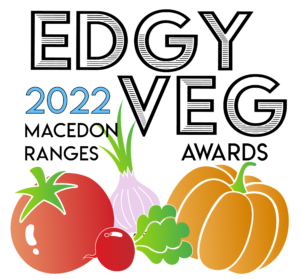
“So many people have come up to me full of excitement about the Edgy Veg Awards saying that finally there are more plant-based options in the Macedon Ranges,” she says. “It warms my heart – that’s what it’s all about really, creating change, bringing joy and health to people, and at the same time reducing harm to animals and the environment.”
As a nation that loves to eat out (and order in), ensuring the availability of great vegan options in food service outlets such as restaurants, cafes and other catering settings is a vital part of the equation.
Group member Lucy Campbell says, “Veg Action is all about supporting and enabling our community to make positive dietary changes, and removing barriers. People are already highly motivated to embrace plant-based eating, so ensuring there are easy and enticing dishes available when eating out or ordering in is a key way to help them put their diet-change goals into action.”
According to a major 2019 report, 42 percent of Aussies are eating less or no meat, with environmental concerns a common motivator. This is part of a major trend towards conscious consumer choices that are kind to the planet and animals.
And, while system-level change is essential, the good news is that people power matters. Just last month, a major new campaign launched in the UK off the back of scientific findings that citizens in wealthy countries “have primary influence over 25-27% of the emissions savings needed by 2030.” Of six actions they are calling on us all to try – starting now – switching to a plant-based diet has the most significant impact.
Australian research published last year found that concern about climate change is prevalent throughout our population, with over 80 percent of us considering it a personal problem. The same researchers have also found that taking positive climate action is one of the most common – and most effective – antidotes to eco-anxiety, with environmental volunteering offering an opportunity to create change, connect with like-minded people, and strengthen our resilience.
Lucy Campbell from Veg Action can attest to this. “Everyone works to their strengths and interests and together we have created a great program of activities and events to move forward the sustainable food agenda,” she says. At the same time, volunteering with the Veg Action group offers sustaining personal connections. “We have a fabulous committee at Veg Action that have been working together for so long now we have all become firm friends.”
Lead image: Yuri A on Shutterstock
In the fast-paced and demanding world we live in, finding moments of stillness and calm can be challenging. In an attempt to find a little peace...
If you want to get your gut in order, Dr Will Bulsiewicz is the expert to help you sort out fact from fiction. This is the gut-health cheat sheet...
Spraying sheets and pillows with calming scents can be a wonderful aid to slumber
The next time you go for a walk, discover the wonder of the everyday world around you
A skincare routine can be a way to nourish yourself inside and out
When the clouds converge, practise gratitude for the smallest of glimmers, and learn to dance in the rain.
With Easter just a few weeks off, here’s our pick of the best vegan chocolate eggs and bunnies available this year.
Being vegan at Easter is a breeze these days, with plant-based chocolate eggs stocked in most supermarkets, and an even more impressive range available to order online. To help you get your vegan Easter sorted, hop into our guide to discover this year’s array of options.

One bite of Pana chocolate, and there’s no looking back. This beloved Australian vegan brand (a repeat winner in the Nourish Vegan Awards, both for its chocolate and its ice cream) started with one store in Melbourne back in 2013, and is now widely stocked in mainstream and independent supermarkets.
This year for Easter, they’ve released a trio of 110g hollow chocolate eggs in Dark, Mylk, and Salted Caramel, made with their signature vegan, organic ingredients, free from refined sugar, and responsibly packaged in beautiful cardboard boxes – plastic free, and printed with vegetable inks.
![]()
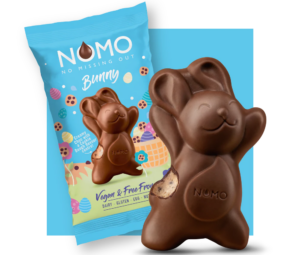
NOMO stands for ‘No Missing Out’, which is exactly the mission of this UK brand, dedicated to making ultra dreamy, creamy vegan and allergy-friendly chocolate that everyone can enjoy. This year, Aussies can choose from their 110g hollow eggs in Creamy Choc or Caramel and Sea Salt, or their adorable Cookie Dough Bunny bars made from plant-based milk chocolate, with a cookie dough flavour centre containing rice cereal and cocoa pieces. Find these goodies in select Woolies, Coles, Big W, Kmarts, and online via specialty retailers such as the Vegan Grocery Store.

With their colourful eco-friendly packaging, you’d buy these beauties on appearance alone, but Loving Earth’s cashew mylk chocolate eggs filled with a soft caramel centre deliver on taste, too. Knowing that you’re buying from an all-vegan, organic certified brand with a commitment to sustainability makes these luscious treats all the sweeter. Find them in selected independent stockists and online.
![]()
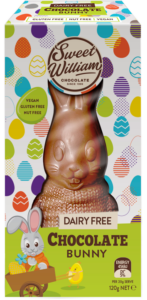
Sweet William have been delivering the dairy-free milk chocolate goods since 1999 and, this Easter, they’re offering an indulgent 140g hollow egg, a 120g Easter bunny, and a 155g multipack of 12 solid bunnies, individually wrapped and ideal for Easter treasure hunts.
As well as being vegan, all Sweet William products are gluten free, nut free, low GI and free from anything artificial. Find them in Coles, Woolworths, Target, Big W and selected IGA stores, or online.
![]()

Medita’s glossy filled mini eggs make a beautiful Easter gift. Available in a variety of pack sizes from 4 to 25, these ganache-filled chocolate treats come in flavours such as salted caramel, Queensland passionfruit, crushed honeycomb, maple pecan praline and, possibly our favourite exotic chocolate flavour combo ever – raspberry lychee rose. Their Easter offering also includes a cute vegan honeycomb bunny made with 70% Zokoko chocolate and packed with nuggets of crunchy golden honeycomb.
As well as being completely vegan, Medita’s range is all gluten-free, soy-free and refined sugar-free, and crafted by a triple Michelin star trained pastry chef. These exquisite treats are available online for delivery Australia wide.
![]()
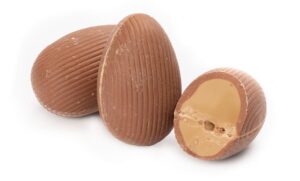
Bulk food stores are a fantastic way to avoid unwanted packaging – and Easter treats are no exception. AU and NZ bulk food chain The Source has a range of Cracking Good vegan Easter eggs made with a mylk chocolate shell and smooth crème filling in either hazelnut or raspberry varieties. These delectable treats are not only plant-based and unpackaged, but certified organic, responsibly traded, and gluten-free, too. The Cracking Good range also has a dark chocolate crème egg with all vegan ingredients, which is a slightly larger size and handmade with 66% cacao Belgian chocolate.
![]()
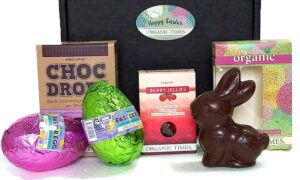
This Organic Aussie brand is widely stocked in independent and healthfood stores, and this year their Easter range includes a 130g vegan chocolate egg and cute Easter bunny in two sizes (70g or 200g). Crafted from decadent, smooth 55% dark chocolate, these treats are made in Australia using the finest organic and fair trade ingredients.
![]()

Koko Black have outdone themselves with their vegan range this Easter. Their luxe handcrafted vegan-friendly treats include dark chocolate Easter bunnies, hollow and filled eggs made from dark and mylk chocolate in a range of sizes, with sophisticated ingredients such as caramelised coconut, quinoa and goji berries, and a raspberry crunch powder filling with the texture of crushed corn flakes. Made with all-natural ingredients and no artificial colours, flavours or preservatives, these treats are made with only the highest quality, sustainably sourced cocoa.
For those who live in or around Sydney, Melbourne, Adelaide or Perth, you can find these goodies in store, with online delivery also available Australia-wide.
![]()

The classic 60% dark choc hollow Easter bunny is back this year, in 100g or 200g sizes. These cuties come wrapped in gold foil complete with ribbon and bell, ideal for Easter egg hunts and gifts. Sourced from fully traced cocoa beans under the Lindt sustainability program, they are widely available in supermarkets and online.
![]()

Last but absolutely not least, is the show-stopping range of chocolate bunnies from Treat Dreams, the multi-award-winning Aussie vegan chocolate brand made with love and fairly traded cocoa in Sydney. If you can’t choose between the hazelnut praline ganache, milk choc, white choc, and cream ‘egg’ bunnies, there’s a gift box containing one of each – packed in an FSC certified cardboard box and printed with soy based inks. Find these delights in selected independent stores and online.
***
For even more options, shop online for extended ranges via specialty retailers such as the Vegan Grocery Store, Vegan Perfection, Ethika Life, or Milo & Finch, who stock many of the brands listed above, plus a whole lot more.
If you want to get your gut in order, Dr Will Bulsiewicz is the expert to help you sort out fact from fiction. This is the gut-health cheat sheet...
In the fast-paced and demanding world we live in, finding moments of stillness and calm can be challenging. In an attempt to find a little peace...
Spraying sheets and pillows with calming scents can be a wonderful aid to slumber
The next time you go for a walk, discover the wonder of the everyday world around you
A skincare routine can be a way to nourish yourself inside and out
When the clouds converge, practise gratitude for the smallest of glimmers, and learn to dance in the rain.
Allowing veggie foods to be labelled with traditionally ‘meaty’ names will help to promote climate-friendly diets, says food awareness organisation ProVeg International, in response to debate over the labelling of plant-based foods in Australia.
An inquiry by an Australian Senate committee issued a report in February which recommended restricting the use of ‘meaty’ names for plant-based products, reflecting concerns expressed by the meat industry that such labelling is misleading.
However, ProVeg argues that regulatory measures should encourage rather than restrict the marketing of plant-based foods since they have far less of an impact on the environment.
“There is consistent evidence that diets high in plant-based foods and lower in animal products are less damaging to the climate,” commented Jasmijn de Boo, Vice President of ProVeg. “Policies must encourage consumers to purchase more plant-based foods and not restrict their consumption through the restrictions on labelling that are being recommended by the Senate committee’s report.”
Professor Clive Phillips of Curtin University Sustainability Policy Institute in Perth, said there were substantial gains to be made by allowing plant-based products to carry meaty names. “Plant based products that mimic meat products offer the potential for very significant improvements in environmental impact, food security, resource utilisation, animal welfare and land available for wildlife. Allowing the manufacturers to refer to the meat products they mimic, whilst ensuring that their plant origin is clear to consumers, provides the fairest information for consumers to allow free choice.”
New South Wales MP Emma Hurst said there was no evidence that consumers were being confused by the labelling of alternative products. “Product names guide consumers on how and where to use them. It seems to me that a push by animal agribusiness to stop alternative products using certain terms is designed to create confusion, not solve it.”
A recent survey by the UTS Institute for Sustainable Futures verified this. The research, commissioned by No Meat May and Vegan Australia, found that only 4 percent of respondents had ever purchased a plant-based product because of confusion with labels, of whom the majority had done so because they were in a hurry.
Ryan Alexander, Co-Founder of No Meat May, said it’s clear that people are actively seeking realistic alternatives to animal meats, and product labelling helps them to find what they’re looking for. “This shift in consumer behaviour is driven by informed consumers making educated choices. Australians are not stupid, and we are not being deceived or tricked into buying meat-free or meat-less alternatives.”
Meat, dairy, fish, and egg production are among the leading causes of human-caused climate change, soil erosion, water pollution, and biodiversity loss.
“With the average Australian eating four times the maximum amount of meat that is considered sustainable, and three times the amount considered healthy, we need our Governments to show leadership and support people shifting to less meat, and not to create barriers for people trying to do the right thing,” said Mr Alexander.
A similar debate over labelling played out in Europe and ended when the European Parliament voted against restrictions on the use of meat denominations for plant-based foods.
If you want to get your gut in order, Dr Will Bulsiewicz is the expert to help you sort out fact from fiction. This is the gut-health cheat sheet...
In the fast-paced and demanding world we live in, finding moments of stillness and calm can be challenging. In an attempt to find a little peace...
Spraying sheets and pillows with calming scents can be a wonderful aid to slumber
The next time you go for a walk, discover the wonder of the everyday world around you
A skincare routine can be a way to nourish yourself inside and out
When the clouds converge, practise gratitude for the smallest of glimmers, and learn to dance in the rain.